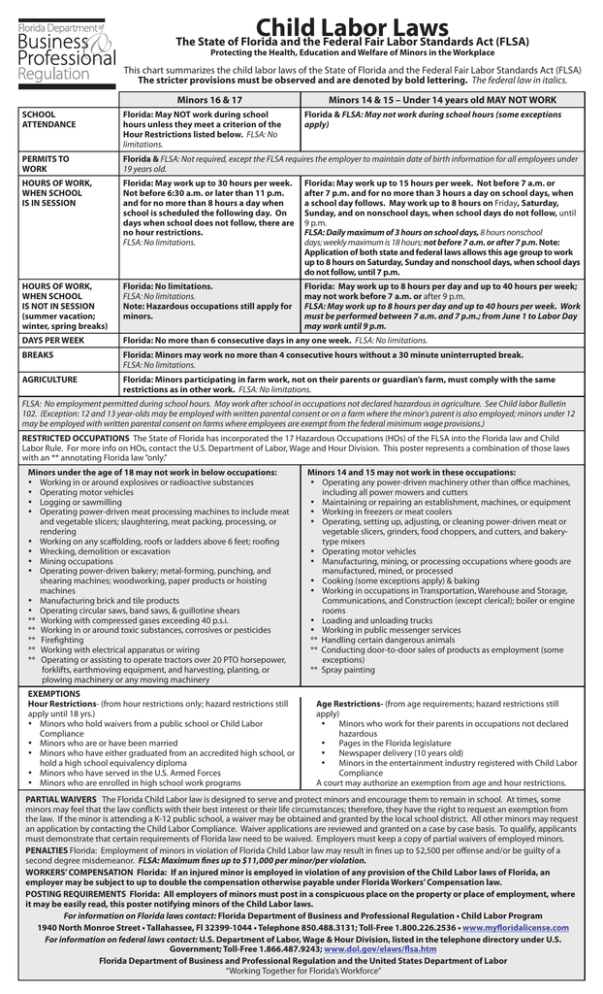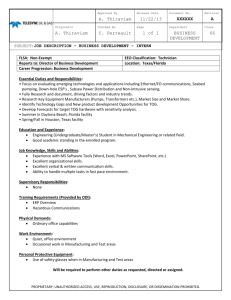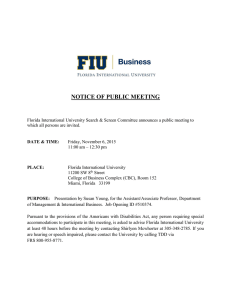Minors 16 & 17
advertisement

Child Labor Laws The State of Florida and the Federal Fair Labor Standards Act (FLSA) Protecting the Health, Education and Welfare of Minors in the Workplace This chart summarizes the child labor laws of the State of Florida and the Federal Fair Labor Standards Act (FLSA) The stricter provisions must be observed and are denoted by bold lettering. The federal law in italics. Minors 16 & 17 Minors 14 & 15 – Under 14 years old MAY NOT WORK SCHOOL ATTENDANCE Florida: May NOT work during school hours unless they meet a criterion of the Hour Restrictions listed below. FLSA: No limitations. Florida & FLSA: May not work during school hours (some exceptions apply) PERMITS TO WORK Florida & FLSA: Not required, except the FLSA requires the employer to maintain date of birth information for all employees under 19 years old. HOURS OF WORK, WHEN SCHOOL IS IN SESSION Florida: May work up to 30 hours per week. Not before 6:30 a.m. or later than 11 p.m. and for no more than 8 hours a day when school is scheduled the following day. On days when school does not follow, there are no hour restrictions. FLSA: No limitations. Florida: May work up to 15 hours per week. Not before 7 a.m. or after 7 p.m. and for no more than 3 hours a day on school days, when a school day follows. May work up to 8 hours on Friday, Saturday, Sunday, and on nonschool days, when school days do not follow, until 9 p.m. FLSA: Daily maximum of 3 hours on school days, 8 hours nonschool days; weekly maximum is 18 hours; not before 7 a.m. or after 7 p.m. Note: Application of both state and federal laws allows this age group to work up to 8 hours on Saturday, Sunday and nonschool days, when school days do not follow, until 7 p.m. HOURS OF WORK, WHEN SCHOOL IS NOT IN SESSION (summer vacation; winter, spring breaks) Florida: No limitations. FLSA: No limitations. Note: Hazardous occupations still apply for minors. Florida: May work up to 8 hours per day and up to 40 hours per week; may not work before 7 a.m. or after 9 p.m. FLSA: May work up to 8 hours per day and up to 40 hours per week. Work must be performed between 7 a.m. and 7 p.m.; from June 1 to Labor Day may work until 9 p.m. DAYS PER WEEK Florida: No more than 6 consecutive days in any one week. FLSA: No limitations. BREAKS Florida: Minors may work no more than 4 consecutive hours without a 30 minute uninterrupted break. FLSA: No limitations. AGRICULTURE Florida: Minors participating in farm work, not on their parents or guardian’s farm, must comply with the same restrictions as in other work. FLSA: No limitations. FLSA: No employment permitted during school hours. May work after school in occupations not declared hazardous in agriculture. See Child labor Bulletin 102. (Exception: 12 and 13 year-olds may be employed with written parental consent or on a farm where the minor’s parent is also employed; minors under 12 may be employed with written parental consent on farms where employees are exempt from the federal minimum wage provisions.) RESTRICTED OCCUPATIONS The State of Florida has incorporated the 17 Hazardous Occupations (HOs) of the FLSA into the Florida law and Child Labor Rule. For more info on HOs, contact the U.S. Department of Labor, Wage and Hour Division. This poster represents a combination of those laws with an ** annotating Florida law “only.” Minors under the age of 18 may not work in below occupations: • Working in or around explosives or radioactive substances • Operating motor vehicles • Logging or sawmilling • Operating power-driven meat processing machines to include meat and vegetable slicers; slaughtering, meat packing, processing, or rendering • Working on any scaffolding, roofs or ladders above 6 feet; roofing • Wrecking, demolition or excavation • Mining occupations • Operating power-driven bakery; metal-forming, punching, and shearing machines; woodworking, paper products or hoisting machines • Manufacturing brick and tile products • Operating circular saws, band saws, & guillotine shears ** Working with compressed gases exceeding 40 p.s.i. ** Working in or around toxic substances, corrosives or pesticides ** Firefighting ** Working with electrical apparatus or wiring ** Operating or assisting to operate tractors over 20 PTO horsepower, forklifts, earthmoving equipment, and harvesting, planting, or plowing machinery or any moving machinery EXEMPTIONS Hour Restrictions- (from hour restrictions only; hazard restrictions still apply until 18 yrs.) • Minors who hold waivers from a public school or Child Labor Compliance • Minors who are or have been married • Minors who have either graduated from an accredited high school, or hold a high school equivalency diploma • Minors who have served in the U.S. Armed Forces • Minors who are enrolled in high school work programs Minors 14 and 15 may not work in these occupations: • Operating any power-driven machinery other than office machines, including all power mowers and cutters • Maintaining or repairing an establishment, machines, or equipment • Working in freezers or meat coolers • Operating, setting up, adjusting, or cleaning power-driven meat or vegetable slicers, grinders, food choppers, and cutters, and bakerytype mixers • Operating motor vehicles • Manufacturing, mining, or processing occupations where goods are manufactured, mined, or processed • Cooking (some exceptions apply) & baking • Working in occupations in Transportation, Warehouse and Storage, Communications, and Construction (except clerical); boiler or engine rooms • Loading and unloading trucks • Working in public messenger services ** Handling certain dangerous animals ** Conducting door-to-door sales of products as employment (some exceptions) ** Spray painting Age Restrictions- (from age requirements; hazard restrictions still apply) • Minors who work for their parents in occupations not declared hazardous • Pages in the Florida legislature • Newspaper delivery (10 years old) • Minors in the entertainment industry registered with Child Labor Compliance A court may authorize an exemption from age and hour restrictions. PARTIAL WAIVERS The Florida Child Labor law is designed to serve and protect minors and encourage them to remain in school. At times, some minors may feel that the law conflicts with their best interest or their life circumstances; therefore, they have the right to request an exemption from the law. If the minor is attending a K-12 public school, a waiver may be obtained and granted by the local school district. All other minors may request an application by contacting the Child Labor Compliance. Waiver applications are reviewed and granted on a case by case basis. To qualify, applicants must demonstrate that certain requirements of Florida law need to be waived. Employers must keep a copy of partial waivers of employed minors. PENALTIES Florida: Employment of minors in violation of Florida Child Labor law may result in fines up to $2,500 per offense and/or be guilty of a second degree misdemeanor. FLSA: Maximum fines up to $11,000 per minor/per violation. WORKERS’ COMPENSATION Florida: If an injured minor is employed in violation of any provision of the Child Labor laws of Florida, an employer may be subject to up to double the compensation otherwise payable under Florida Workers’ Compensation law. POSTING REQUIREMENTS Florida: All employers of minors must post in a conspicuous place on the property or place of employment, where it may be easily read, this poster notifying minors of the Child Labor laws. For information on Florida laws contact: Florida Department of Business and Professional Regulation • Child Labor Program 1940 North Monroe Street • Tallahassee, Fl 32399-1044 • Telephone 850.488.3131; Toll-Free 1.800.226.2536 • www.myfloridalicense.com For information on federal laws contact: U.S. Department of Labor, Wage & Hour Division, listed in the telephone directory under U.S. Government; Toll-Free 1.866.487.9243; www.dol.gov/elaws/flsa.htm Florida Department of Business and Professional Regulation and the United States Department of Labor “Working Together for Florida’s Workforce”



